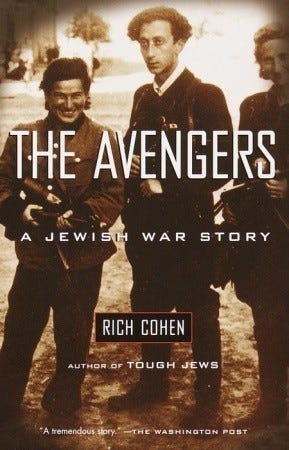🎻A Fiddler on the Roof. Sounds crazy, no?
On balancing tradition with secularism, and a book rec on Jewish resistance.
This week’s drop is dedicated to Chaim Topol, who brought our beloved Tevye to life in Fiddler on the Roof. Topol, one of Israel’s most famous actors, passed away yesterday at the age of 87, but his memory lives on as Jews everywhere continue to embrace their culture and most importantly — traditiooooon!
Topol’s passing made me think of the themes of Fiddler, specifically about tradition. As a wandering Jew (wandering in terms of my beliefs and Jewish practice), I often think of what tradition means to me. Some days I embrace it more than others, with thoughts like:
It would be nice to fully rest on the Sabbath - no spending money, no taking the Subway, phone off.
I want to dress in my Shabbos best even though I feel like staying in jeans.
I’m going to wash my hands before motzi even if I’m the only one doing so.
But other days, my beliefs are:
But life is short and I got stuff to do on a Saturday morning.
But it’s cold and rainy and I just want to be comfy.
No time to wash my hands; I’m hungry and don’t want to hold up the blessings for everyone else!
Okay, these examples aren’t as dire as watching your daughter marry out of the faith like Tevye dealt with, but they are personal examples of times when I grapple with tradition on the never-ending journey of defining what Judaism means to me, when I want to uphold parts of Jewish tradition that are most meaningful to me while balancing secularism or the everyday hustle and bustle.
I also often think of younger generations becoming more detached from religion and what that means for the future of Judaism. It’s nice to find creative ways to run a Shabbat dinner, but in my opinion, if you drop important aspects of the tradition like the blessings (I recently went to a Shabbat dinner where they didn’t say kiddush!), or discussing ideas from the Torah, does Judaism even have a purpose? Isn’t it just a dinner?
I try to live my life by following my heart and doing what feels right. That’s why it’s hard for me to identify what level of Jewish I am, but that’s for a whole other blog post. As long as I am embracing my culture in some way and am continuously learning, I’m successfully “doing Jewish.” What do you think? Can you relate?
Speaking of tradition and Shabbat, aside from a lovely Shabbat meal a JDC board member hosted last week, I feel like I haven’t had a proper sit-down Friday night meal in a while. I’ve either been going to a service and coming home, or going to a Jewish social, which is loads of fun but there’s no soul there, just acquaintances and free liquor.
That is why I am very excited to be going home this weekend, where I at least get free liquor paired with a homemade dinner. Just kidding, parents! When I am home, I encourage my folks to embrace the connectivity and peace of Friday night. Instead of jumping to the TV to watch a movie, we eat a homemade meal around the table. Instead of taking out our phones, we light Shabbat candles and share the highlight of our week. We find a nice balance that works for all of us though: we embrace these traditional aspects of Shabbat and then watch a film together after the meaningful conversation. It is Oscars Weekend after all…
Then on Saturday we take it easy. My mom and I will usually go for a walk together, and my dad will show me the latest articles he finds on the Internet, which are usually pretty Jewish in nature. And I wouldn’t have it any other way.
Shabbat Shalom and may you continue to embrace tradition in however that may look: eating pastrami sandwiches, learning Hebrew or Yiddish, giving to charity, or praying. Either way, I think Tevye would be proud.
The Holocaust Story You Don’t Hear About
On the theme of Eastern European Jews, there’s a name you should know, and that’s Abba Kovner. I recently read The Avengers: A Jewish War Story by Rich Cohen, the true account of a group of Jewish partisans from the Vilna ghetto that hid out in the Baltic forest and killed Nazis.
Abba led this group, along with two brave young women, Vitka Kempner and Ruzka Korczak. I felt many emotions while reading this book: sad, pensive, inspired. It was tough to read at times, but important to read of stories of Jewish resistance because it makes me think what I would have thought or done had I been a Jew in Europe at the time. Would I have given up, or would I have fought every chance I could? Would it have been so easy to kill a stranger in cold blood for the survival of my people?
The book then takes the reader to Mandatory Palestine, from detention centers to kibbutzim to Jerusalem, where we meet a young David Ben-Gurion, the first Prime Minister of Israel. Here, the question arises concerning the next chapter in Jewish history: is it healthy to live in the past and dwell on revenge, or put all your energy into building a new life in a new land?
Bonus: the audiobook is narrated by Larry King!




It is better more often than not to question what you believe and why you believe what you do than to simply believe because you were told or learned when young to believe. By questioning your beliefs you can add, subtract and or affirm them as you grow.
Well for years I traveled with a prayer book. I would never travel without it.
And yet I never opened it.
That might be the height of extremes!
And a divided personality and mind!
On traveling 2 months in Italy, having just returned, I searched in each city the area where Jews lived.
I even had discussions with museum directors ( museums of their towns) why Jews were NEVRR mentioned. Did they have no role in the town’s development? Why was their contributions still invisible?
I never received any answers that satisfied me.